View Sumitomo Corporation's Sustainability : Sustainable Use of Natural Resources and Circular Economy
Economic and social activities based on mass production, mass consumption, and mass disposal not only hinder sound material circulation, but are also closely related to various environmental issues, such as climate change, the depletion of natural resources, and the loss of biodiversity caused by large-scale resource extraction. Efforts to realize a circular economy, which is an economic system that aims to maximize the value of resources and products, reduces resource input and consumption, and minimizes waste generation, while transitioning away from conventional economic and social models, have become a shared challenge for the international community, alongside climate change mitigation and biodiversity conservation. In addition, in recent years, increasing emphasis has been placed on the role of the circular economy in enhancing industrial competitiveness and ensuring economic security.
The Group will make effective use of limited resources and contribute to the realization of sustainable resource recycling by switching to resource-saving technologies and products, and working on sustainable procurement from forests and other natural resources.
Forests are a circulative resource that can be permanently regenerated through continuous planned logging and regrowth. In addition to providing diverse food sources and timber products in each region, appropriate management of these resources contributes to the conservation of biodiversity and mitigation of climate change by capture and storage of CO2. The Sumitomo Corporation Group, conducting business using these precious resources, implements sustainable forest management to maximize the environmental and social value provided by them, while striving to strengthen governance to prevent deforestation, forest degradation, and human rights violations.
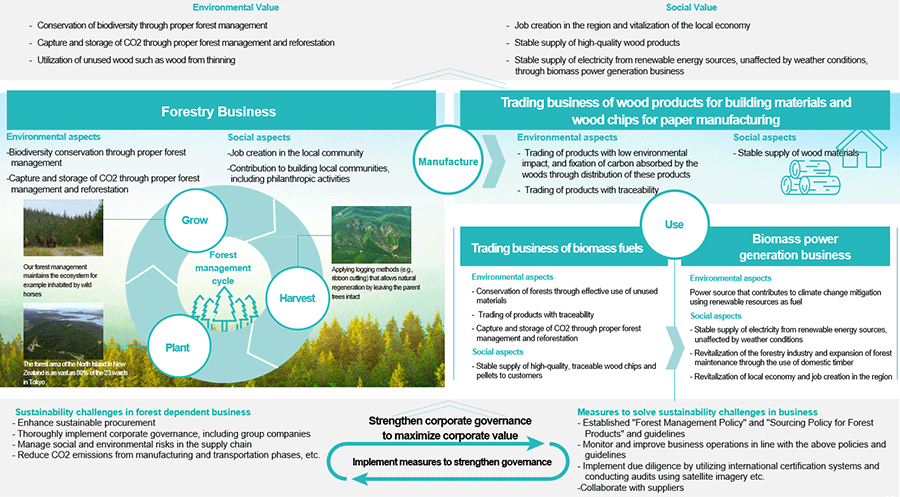
We established the Sumitomo Corporation Group Forest Management Policy and Sumitomo Corporation Group Sourcing Policy for Forest Products in March 2022. Furthermore, in order to reinforce due diligence to mitigate risks, we also set Operational Guidelines for putting the policies into actions.
Established in March 2022
Forestry business directly managed by Sumitomo Corporation and its Consolidated subsidiaries. In addition, other forestry business that Sumitomo Corporation and its subsidiaries are involved in management are included if determined to be material.
This policy was approved by the Management Council and the Board of Directors of Sumitomo Corporation. If any serious issues arise in implementing this policy, measures and corrective action plans will be discussed at the Corporate Sustainability Committee and reported to the Management Council and the Board of Directors.
Based on the principles of zero deforestation and respect for human rights, Sumitomo Corporation will strive to implement the following in its sustainable forest management, with the cooperation of its Group companies.
Environmental aspects:
Social aspects:
To reinforce due diligence to mitigate risks, we have also set operational guidelines for putting the policy into actions.
Risk assessment and monitoring:
Certification:
Stakeholder dialogue:
Disclosure:
Reviewing process of the Guidelines:
Established in March 2022
Logs, wood products (plywood, lumber, veneer, laminated timber), wood chips and wood pellets traded by Sumitomo Corporation and its Consolidated subsidiaries.
This policy was approved by the Management Council and the Board of Directors of Sumitomo Corporation. If any serious issues arise in implementing this policy, measures and corrective action plans will be discussed at the Corporate Sustainability Committee and reported to the Management Council and the Board of Directors.
In accordance with the principles of zero deforestation and respect for human rights, Sumitomo Corporation will strive together with its Group companies to source products based on this policy while cooperating with suppliers and customers.
Environmental aspects:
Social aspects:
To reinforce due diligence to mitigate risks, we have also set operational guidelines for putting the policy into actions.
Monitoring:
Stakeholder dialogue:
Disclosure:
Reviewing process of the Guidelines:
We spoke to group companies conducting forest management to understand their response to mitigating environmental and social risks, including forest conservation, mitigation of impacts on ecosystems, and consideration of local residents, and we confirmed that activities conducted during FY2024 were in line with our Forest Management Policy. We also confirmed compliance of our forest product suppliers with the commitments of our Sourcing Policy for Forest Products during FY2024, using an annual questionnaire and on-the-spot surveys.
In New Zealand, a sustainable supply of timber resources is provided on a 30-year cycle through a harmonious arrangement with local communities under the environmentally friendly forest management system of planting trees, growing them, cutting them down, and replanting them. In the approximately 66,000 hectares of forest owned by Summit Forests New Zealand Limited., besides protecting water resources, cultural sites, and indigenous biodiversity conservation areas, the company has also forged friendly relationships with the indigenous Māori people in the course of running its business. Moreover, much of the company’s forest holdings are international forest management certified, which offers objective proof that the company is managing the forest appropriately.
Please see here for more details on the Forestry business in New Zealand.
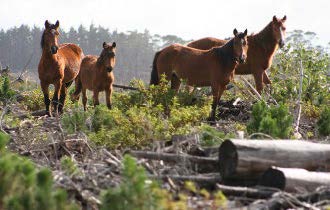
Forest owned by SFNZ
Reducing the usage of plastic resources while ensuring its effective consumption - importance of this issue is increasing year by year as a measure for addressing global environmental issues, such as marine litter and global warming. In this context, importance of resource recovery system is increasing, to materialize and enhance sustainable resource recycling. Tomra Japan is a joint venture between TOMRA Systems ASA (Norway) and our company. In addition to selling equipment such as reverse vending machines (RVMs) for the efficient collection of used PET bottles, we have also created and deployed a recycling system whereby we collect PET bottles from RVMs installed at supermarkets and other retail stores and deliver them to recyclers. RVMs only collect PET bottles after their caps and labels are removed by the consumers, this enables us to collect high-quality resources with fewer impurities. Through the supply of high-quality recovered resources, Tomra Japan has been contributing to horizontal recycling, in which fresh PET bottles are made from used PET bottles. In addition to such activities, in 2021 the company launched a new brand named “bottlium®” with the aim to contribute to the recycling of PET bottles into polyester clothing. As a practical example, the bottlium® material is being used for the attendant uniforms at the Sumitomo Pavilion, at Expo 2025 Osaka. By recycling PET bottles into clothing that can be repeatedly washed, continuing the horizontal recycling of PET bottles, and encouraging consumers to actively take part in collecting and recycling higher-quality resources in an efficient manner, Tomra Japan will continue to contribute to the reduction of environmental burden and the development of a recycling-based society.
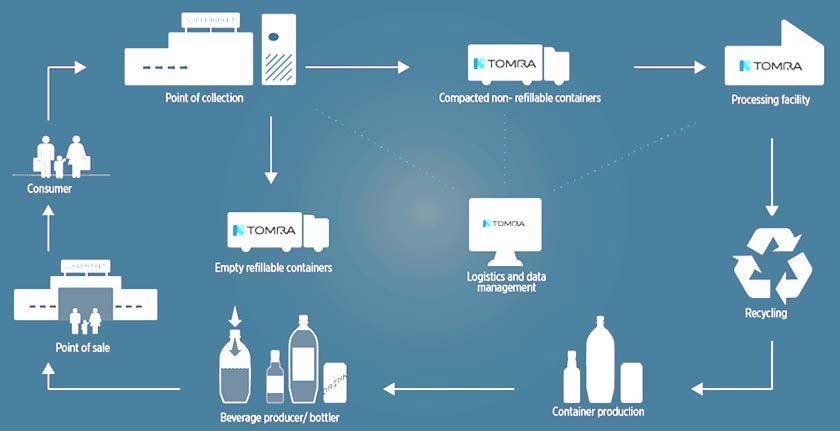
Circulation recycling system with RVM as a platform
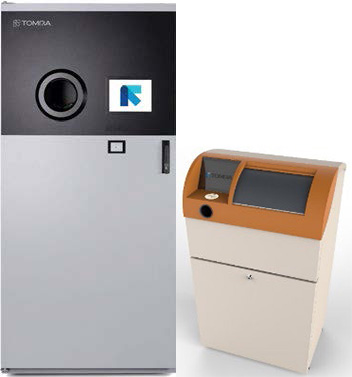
Reverse Vending Machine

“bottlium®” – New brand of recycled PET bottle by Tomra Japan. Made from the high-quality resources (used PET bottles) collected by Tomra Japan, through chemical agent-free aqueous cleaning process.
The highest quality expands the possibilities for various applications such as hollow fibers.
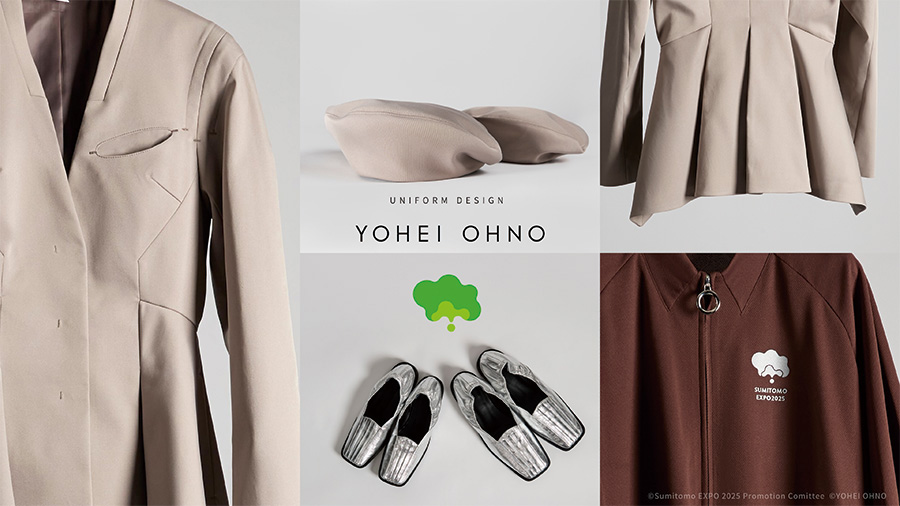
It is used in the jackets and pants of the attendant uniforms at the Sumitomo Pavilion.
Sumisho Global Logistics Co., Ltd.(SGL), which handles the logistics functions of our group, operates a rental business for MAXICON, a foldable IBC (※) with inner liner. While traditionally many IBCs in the food and cosmetics industries were purchased as disposable items, MAXICON has led the industry as a pioneer of "rental IBCs," realizing circular logistics that significantly reduces waste.
Additionally, companies that previously used smaller containers such as 18-liter cans, bag-in-box packaging, and drums are increasingly adopting MAXICON due to its superior operational and transport efficiency, especially against the backdrop of serious challenges including Japan's aging population with low birthrate and rising freight and packaging material costs. This shift away from using/disposing of smaller containers contributes to resource conservation. From now on, SGL will continue working on sustainable logistics with MAXICON.
MAXICON website (Japanese only)
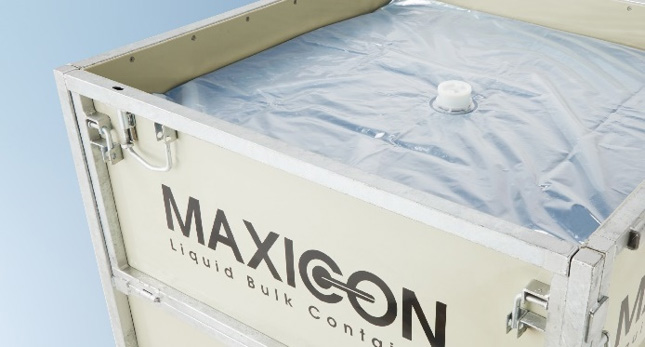
Flagship Product: MAXICON JMK-2
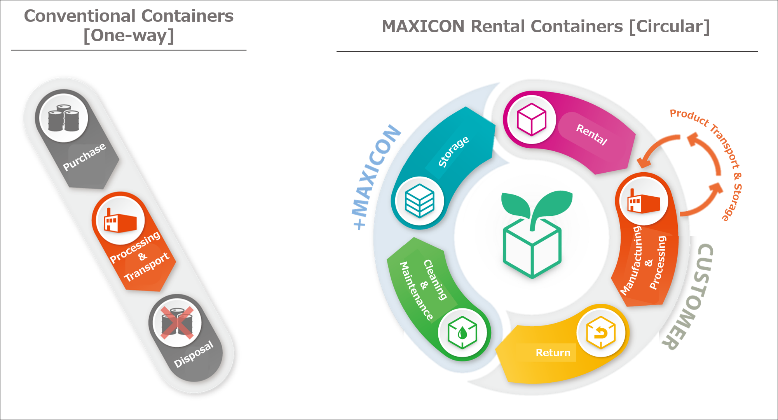
Circular Logistics by MAXICON
Sumitomo Corporation is contributing to reducing the environmental impact of mining operations through our investment in JEX Technologies, Inc., based in Reno, NV, USA. JEX Technologies’ Hydro-Jex® technology recovers residual metals from heap leaching pads in mines of copper, gold, and other metals. This technology increases metal production without increasing total tonnes mined, thereby reducing greenhouse gas emissions per unit of production, and indirectly contributing to the reduction in the number of new mines needed to meet global metal demand. Lastly, this technology improves the stability of heap leaching pads and reduces the risk of hazardous substance leakage.

We are working toward our goal of actively promoting the sale of certified timber. The following table shows our actual use of certified timber in New Zealand (Summit Forests New Zealand) during FY2024.
| FY2024 Results | |
|---|---|
| Certified log (New Zealand) | 237 thousand tons |